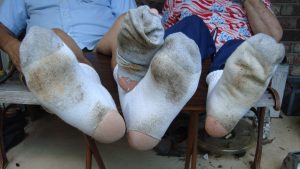
What’s worse than wearing wet socks? Okay – wet, dirty socks. Or wet, dirty socks with holes. Ooh, ooh, the worst – cold, wet, dirty socks with holes.
If your feet are in clean, dry socks with no need of mending, think for a moment about those not so lucky.
Homeless shelters are continuously in need of new socks. If you’re homeless, you walk – a lot. Many homeless walk several miles every day for food, shelter, and other essentials. Getting the assistance you need is easier when your feet are healthy and don’t have blisters. People are often more motivated to seek employment and keep it when they feel confident in the way they look. Wearing socks and shoes with holes decreases their sense of self-worth. A clean set of socks is often the first step in restoring their feeling of dignity.
Wet socks breed bacteria, which can cause infection. And since more than a million Americans have diabetes, wearing cold, wet, holey, dirty socks puts them at greater risk of skin injuries and infections. According to WebMD, diabetics should never walk barefoot and should wear comfortable socks and shoes that fit well and protect the feet. For more foot care tips, see Tips on Good Foot Care.
If you like keeping things local, know that cotton is considered a power crop in the panhandle of Florida. It’s rotated in alternate years with peanuts to avoid pests, diseases, and weeds. Some socks are 100% cotton; many are a blend of cotton mixed with other fibers.
So, help the local economy in the Florida Panhandle and help someone by giving them socks. Buy new socks with cotton. Keep a pair for yourself and donate some to a homeless shelter near you. (Waterfront Mission is a great place to start – Waterfront Mission Donations.) You’ll feel better and so will they.
 0
0
